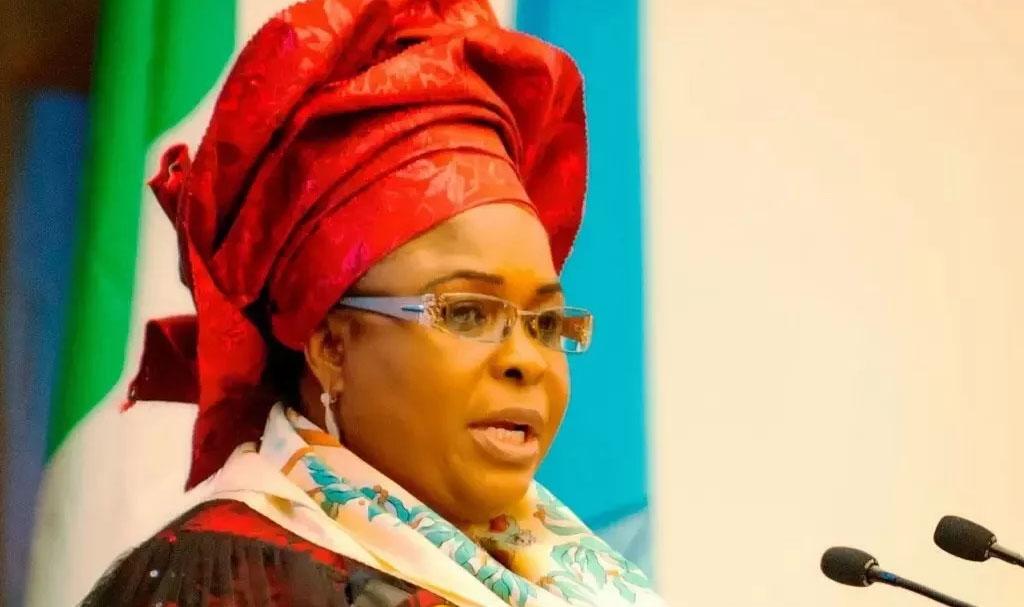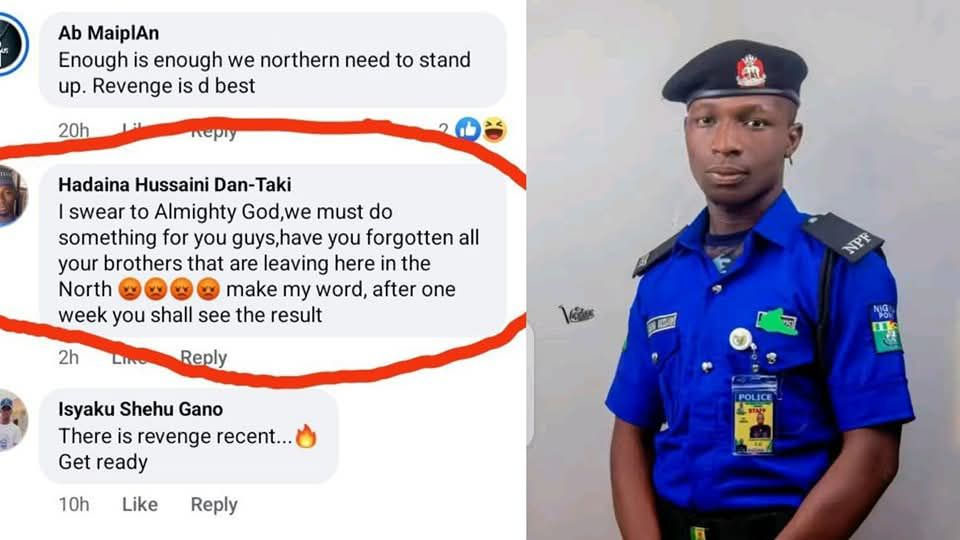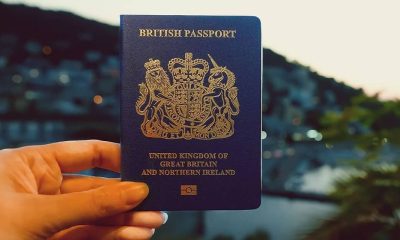metro
Police hunt man who escaped to Nigeria after rape sentence in UK

Police hunt man who escaped to Nigeria after rape sentence in UK
The police have vowed to investigate the case of Kelechukwu Orji, a 48-year-old British fugitive who fled the UK to Nigeria after being sentenced to 15 years for rape.
ACP Olumuyiwa Adejobi, spokesperson for the Nigeria Police Force, said he will keep reporters updated on the situation.
Orji was found guilty of two counts of rape, one count of attempted rape, one act of assault by penetration, and one count of sexual assault by a Crown Court in Lewes, East Sussex, England, on November 22, 2023.
According to Premium Times, following Orji’s conviction, the trial court ordered a pre-sentence report to determine whether he posed a significant risk of serious injury if he committed other crimes.
Orji was allowed to settle his affairs before his sentencing and imprisonment, which were scheduled for the next day.
Orji, on the other hand, did not appear in court the next day, when it was revealed that he had fled England for Nigeria on the evening of November 22, 2023.
READ ALSO:
The victim, described as AB, a woman in her early twenties, arrived in the UK in September 2020 to work as a housekeeper for the criminal.
She was, however, subjected to sexual assault by the convict.
The court said, “The first occasion on which AB was raped (count 4) occurred when the offender came into her bedroom late at night. He pulled her from her bed and dragged her downstairs. He forced her into the living room, where he made her bend over. AB put up a struggle. Eventually, the offender was able to pull down her leggings. He held her from behind while he raped her vaginally. AB told him to stop. The offender ignored her. He ejaculated.
“The remaining counts reflected a single continuing incident. It began in the kitchen. The offender’s wife had gone to work. The offender asked AB to come and make him some food. When she came into the kitchen, the offender pressed her breasts over her clothing (count 8). He then grabbed hold of AB. He said that she had to let him have sex with her. She struggled and begged him not to do it. As he held her down, the offender digitally penetrated AB (count 9).
“Thereafter, the offender pulled her into the living room. AB repeatedly said, ‘Stop, I don’t want this.’ The offender ignored AB, who was struggling and trying to bite the offender. He held her down and raped her vaginally (count 10). He ejaculated inside her.
“AB had downloaded a recording app onto her telephone after the first incident of rape. She audio-recorded significant parts of this final incident.
“The offender had threatened AB that if she were to tell anybody about what had happened, she would not be safe in Nigeria when she returned home. AB did disclose something about what was happening to her boyfriend back in Nigeria. In October 2020, she contacted a support group for Nigerians in the United Kingdom. A member of the group contacted the police to say that they were concerned for the safety of AB. The address of the offender was given as the place where AB was living.”
Police hunt man who escaped to Nigeria after rape sentence in UK
metro
Kogi East APC chairman dies at 45

Kogi East APC chairman dies at 45
The Kogi East zonal chairman of the All Progressives Congress (APC), Suleiman Muhammed, has died suddenly at the age of 45.
Reacting to the ugly development, Kogi State Governor, Ahmed Ododo, expressed heartfelt sympathy over the demise of the party chieftain.
In a condolence message to the family of the deceased and members of the APC in Kogi state, Ododo described the sudden passing of the APC Zonal chairman as a loss not only for the party in Kogi East but the entire APC family in the state.
A statement signed by Special Adviser on Media to the Governor, Ismaila Isah, quoted Ododo as saying : “The late Hon. Suleiman Muhammed was a man of peace, humility, and one who demonstrated commitment to the service of the state and the APC as a party. He carried the aspirations of his people with dignity; his leadership was widely respected and his contributions deeply valued within and beyond the APC in Kogi East”.
READ ALSO:
- Patience Jonathan’s ex-aides to remain in jail as court adjourns case again
- Ronaldo’s brace powers Al-Nassr to derby win over Al-Hilal
- Uromi killings: Man in police uniform who threatened reprisal arrested
“He was instrumental in strengthening party cohesion and promoting inclusive dialogue. His presence in every party engagement brought stability and thoughtful leadership to our consultations in the zone.”
Governor Ododo further noted that Hon. Suleiman’s calm temperament, sense of fairness, and ability to listen distinguished him as a unifying figure in the party.
The Governor also extends condolences to the family of the deceased, the leadership and members of the APC in the state, the people of Dekina local government area and the entire Kogi East Senatorial District.
The late APC zonal chairman who served as the APC coordinator in Odu Ward 2 before becoming the zonal chairman of the party in Kogi East has been laid to rest according to Islamic rites.
Kogi East APC chairman dies at 45
metro
Patience Jonathan’s ex-aides to remain in jail as court adjourns case again

Patience Jonathan’s ex-aides to remain in jail as court adjourns case again
Some former domestic staff of ex-First Lady Patience Jonathan, who are being jailed in the Okaka Custodial Centre, Bayelsa State, have condemned their maltreatment and delayed trial, alleging they are enduring hardship and torture.
Two of the workers, who talked exclusively with Saturday PUNCH on Friday, asked for rescue, claiming they were imprisoned.
According to our sources, the workers have been at the prison institution since 2019, as their trial has been repeatedly delayed owing to adjournments.
Those affected are Williams Alami, Vincent Olabiyi, Ebuka Cosmos, John Dashe, Tamunokuro Abaku, Emmanuel Aginwa, Erema Deborah, Precious Kingsley, Tamunosiki Achese, Sunday Reginald, Vivian Golden, Emeka Benson, Boma Oba, Salomi Wareboka, and Sahabi Lima.
The defendants were taken before the High Court of Bayelsa sitting in Yenagoa, the state capital, in 2019.
They were accused of stealing seven gold bangles and jewellery, five Samsung air conditioners, two sets of upholstery chairs, and six Samsung flat-screen televisions worth ₦200 million.
They were also charged with 18 charges of conspiracy to commit murder and conspiracy to commit crimes, namely armed robbery, burglary, and theft, among others.
A charge read, “Golden Vivian, Erama Deborah, Precious Kingsley, Vincent Olabiyi, Ebuka Cosmos, Wiliams Alami, Tamunokuro Abaku, Boma Oba, Emmanuel Aginwa, Emeka Benson, Tamunosiki Achese Fiberesima, Wariboko Salome, Sahabi Liman, Reginald Sunday, John Dashe and others now at large, sometime in June 2019 at Otuoke community in Ogbia Local Government Area of Bayelsa State, within the jurisdiction of this honourable court, did conspire to kill Her Excellency Dame Patience Jonathan (former First Lady of the Federal Republic of Nigeria) and thereby committed an offence.”
READ ALSO:
- Ronaldo’s brace powers Al-Nassr to derby win over Al-Hilal
- Uromi killings: Man in police uniform who threatened reprisal arrested
- Wife of Manchester United goalkeeper, Onana, robbed of £62,000 handbag, Rolex
One of the defendants, who spoke to journalists from prison, decried that they were being unlawfully detained.
The detainee mentioned that up till that moment, the police had yet to present any evidence against them.
“We have been in prison since 2019. We were domestic staff of the former first lady, Patience Jonathan. In 2019, there was a case of breaking into one of her apartments in Otuoke, and she decided to arrest all her workers.
“We were not even working in that apartment; since then, there has been no evidence to prove to the court, and the case is not proceeding; she is still waiting for witnesses to come till today.
“Please, we need your intervention. We need help,” the detainee noted.
Another detained staff member alleged that they were being maltreated on the orders of the former first lady.
The inmate said, “These people want to kill us. In this prison, they are threatening us. Anything you can do for us to leave here, please do. When I was at the station, they tortured us and threatened they would take us to the back and beat and hang us.
“After they beat us, she would be on the phone listening to our voices and telling them it was not enough that they should bring us to her hotel and house. That is how we have been treated.”
Chronicle NG gathered that it learnt that efforts by a human rights organisation, Tech4Justice, to secure the release of the defendants on bail were frustrated.
The group accused the Bayelsa State courts of bowing to pressure from important individuals connected to the former first lady.
A legal partner of the group, Funmi Adedoyin, provided insight into the problems surrounding the case, stating that the prosecution had not finished its case and that the accused had not opened their defence.
She disclosed that the case had been adjourned more than 40 times between 2019 and 2025.
Adedoyin said, “We have filed applications, made representations, and sought bail on many occasions. But the judiciary appears unwilling to proceed with the case. These young men and women have been forgotten in prison.
“Due to the political weight of the complainant in the matter, we have encountered several hurdles. The judge who was handling the case was later elevated to the position of Chief Judge of Bayelsa State.
READ ALSO:
- Benue bandit update: Police rescue 14 abducted bus passengers
- Delta man accused of raping 10-year-old daughter, infecting her wife HIV
- How scavenger triggered explosion of military grenade in Lagos
“Since her elevation, it has been difficult for her to combine administrative duties with presiding over this particular case. She is often away on official assignments. However, in recent times, she has begun to give the matter some attention, with efforts towards accelerated hearing.”
The lawyer also condemned the frequent absence of police prosecutors in court, saying it had further stalled proceedings.
“For the past two adjournments, last month and again on Wednesday this week, the case could not proceed because the police prosecutor was absent. Several police officers have handled the case, and most of them have been transferred out of Bayelsa, with some now serving in Lagos and other places. They often give excuses about being on special assignments.
“Many of the adjournments have been due to the absence of police witnesses. Also, the general slow pace of justice in Nigeria contributes to the delay, especially as courts went on vacation for several months,” she said.
Adedoyin stated that efforts were made to secure the detainees’ bail, but the applications were denied at the early stage of the trial.
“They have been behind bars. We applied for bail at the beginning of the case, but it was denied. The trial has been ongoing, but several factors have delayed it until now,” she said.
She lamented over the plight of one of the female defendants who lost her child while in custody and was unable to attend the funeral.
“Three of the defendants are currently on bail on health grounds, including one who had tuberculosis,” the counsel added.
Adedoyin stated that rather than investigating individuals directly engaged in the theft, the police arrested all domestic staff on the complainant’s purported request.
She disclosed that, in addition to what had previously been published, the 15 domestic staff members had been charged with conspiring to murder the former First Lady.
“Everyone in the villa was arrested. The police know that stealing is a bailable offence. Because of that, they charged them with another offence entirely different from the alleged theft of the jewellery – conspiracy to kill Madam Patience Jonathan. This is another exposé on what happened.”
“This was to ensure that they would not have any means of escape. The police did not even have any evidence suggesting that these people were armed. That is why it has been very difficult to secure their bail,” she added.
At the time of filing this report, the former First Lady had yet to comment on the incarceration of her former domestic workers.
Patience Jonathan’s ex-aides to remain in jail as court adjourns case again
metro
Uromi killings: Man in police uniform who threatened reprisal arrested

Uromi killings: Man in police uniform who threatened reprisal arrested
The Kaduna State Police Command has distanced itself from an individual, Hadaina Hussaini (Dan-taki), who was seen wearing a police uniform while making inflammatory comments on social media.
Reports indicate that Hussaini, posing as a law enforcement officer, issued threats of retaliation against southerners residing in northern Nigeria. His remarks came after the brutal killings of 16 northerners in Uromi, Esan North East Local Government Area of Edo State.
In a Facebook post on Tuesday, Hussaini swore by Almighty God, vowing that northerners would take severe action against southerners. He wrote, “I swear to Almighty God, we must do something for you guys, have you forgotten all your brothers that are leaving here in the North make my word, after one week you shall see the result.”
A statement issued by the command’s Public Relations Officer, DSP Mansir Hassan, clarified on Friday night that Hussaini is not a member of the Nigeria Police Force, nor is he affiliated with the Kaduna State Police Command. According to the police, Hussaini had once been a part of the Police Special Constabulary at the Kaduna State Constabulary Office, but he was dismissed two years ago due to his questionable conduct.
READ ALSO:
- Wife of Manchester United goalkeeper, Onana, robbed of £62,000 handbag, Rolex
- Benue bandit update: Police rescue 14 abducted bus passengers
- Delta man accused of raping 10-year-old daughter, infecting her wife HIV
Hassan cautioned the public to be vigilant and ensure they verify the identity cards of police personnel. He also confirmed that the suspect had been apprehended and would face legal proceedings after a preliminary investigation.
The statement explained, “The attention of Kaduna State Police Command has been drawn to a comment made on a Facebook post credited to one Hadaina Hussaini (Dan-taki), which has been circulating on various social media platforms with the caption ‘Kaduna Police Officer Threatens Retaliation Against Southerners in Uromi Killings.’”
“It is pertinent to note that Hussaini is neither a member of the Nigeria Police Force nor a personnel of Kaduna State Police Command. The image of him in police uniform shared on social media was from when he was part of the Police Special Constabulary, a position he was dismissed from two years ago due to his questionable character.”
The statement continued, “The suspect has been arrested and will be charged in court after the completion of preliminary investigations according to the law. The Kaduna Police Command emphasizes that the Nigeria Police Force remains a disciplined institution that does not tolerate incitement or hate speech.”
Police Commissioner, CP Rabi’u Muhammad, urged the public to remain calm and continue reporting suspicious activities to the authorities.
Uromi killings: Man in police uniform who threatened reprisal arrested
-

 metro2 days ago
metro2 days agoMan jailed 3 months for non-declaration of $30,000 at airport
-

 International2 days ago
International2 days agoTrump slams Nigeria with high tariff in shocking trade crackdown
-

 metro2 days ago
metro2 days agoUpdated: Notorious bandit leader Bello Turji goes berserk, kills 12 for Eid
-

 metro1 day ago
metro1 day agoPetitioners mobilise constituents for fresh Natasha’s recall
-

 metro6 hours ago
metro6 hours agoScavenger killed, many injured as military grenade explodes in Lagos
-

 metro3 days ago
metro3 days agoEdo Gov Okpebholo wins round one as tribunal upholds his election
-

 metro1 day ago
metro1 day agoFraud rocks FIRS, court orders final forfeiture of Abuja, Kano houses linked to official
-

 metro2 days ago
metro2 days agoSouth African court acquits Nigerian pastor of rape after 8 years in jail













